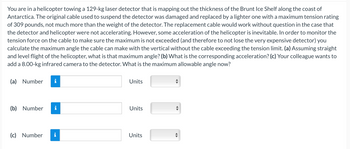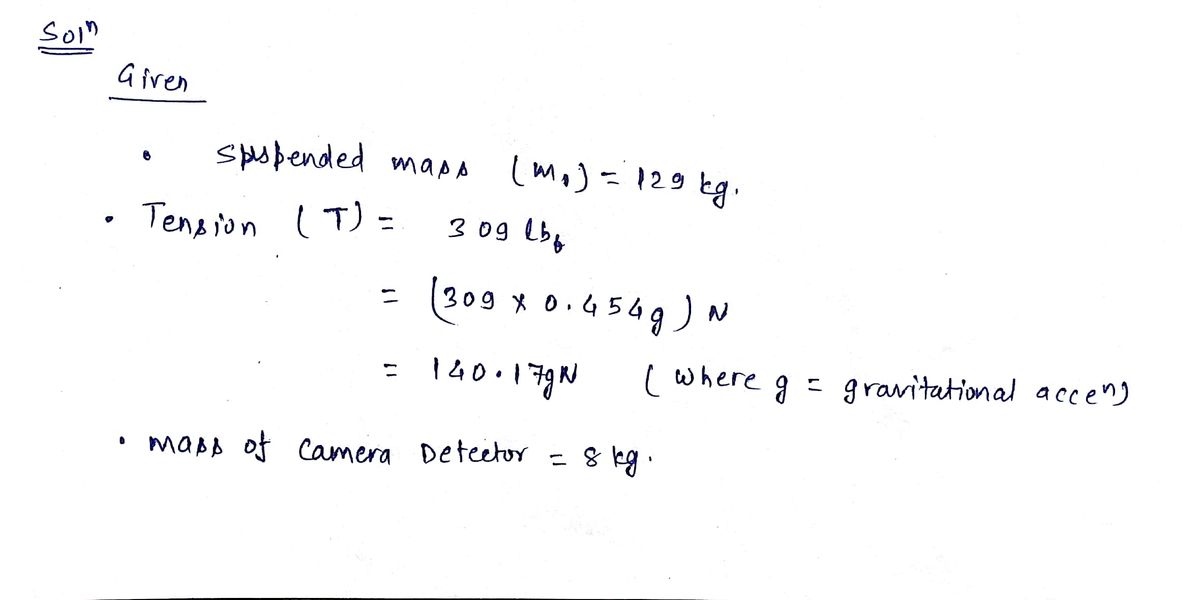
College Physics
11th Edition
ISBN: 9781305952300
Author: Raymond A. Serway, Chris Vuille
Publisher: Cengage Learning
expand_more
expand_more
format_list_bulleted
Concept explainers
Topic Video
Question

Transcribed Image Text:You are in a helicopter towing a 129-kg laser detector that is mapping out the thickness of the Brunt Ice Shelf along the coast of
Antarctica. The original cable used to suspend the detector was damaged and replaced by a lighter one with a maximum tension rating
of 309 pounds, not much more than the weight of the detector. The replacement cable would work without question in the case that
the detector and helicopter were not accelerating. However, some acceleration of the helicopter is inevitable. In order to monitor the
tension force on the cable to make sure the maximum is not exceeded (and therefore to not lose the very expensive detector) you
calculate the maximum angle the cable can make with the vertical without the cable exceeding the tension limit. (a) Assuming straight
and level flight of the helicopter, what is that maximum angle? (b) What is the corresponding acceleration? (c) Your colleague wants to
add a 8.00-kg infrared camera to the detector. What is the maximum allowable angle now?
(a) Number
(b) Number
(c) Number
IN
I
IN
Units
Units
Units
Expert Solution
arrow_forward
Step 1

Step by stepSolved in 2 steps with 2 images

Knowledge Booster
Learn more about
Need a deep-dive on the concept behind this application? Look no further. Learn more about this topic, physics and related others by exploring similar questions and additional content below.Similar questions
- two masses are connected by a light string that passing over a frictionless pulley. Mass m1 =3.34kg is on a 50.0-degree incline, and mass m2 =14.2 kg is hanging on the string. the system starts from rest. If the coefficient of the friction between m1 and the incline is 0.878, find the acceleration of the system, in m/s^2.arrow_forwardTwo objects are connected by a light string that passes over a frictionless pulley as shown in the figure below. Assume the incline is frictionless and take m, = 2.00 kg, m, = 7.30 kg, and e = 52.0°. Use g=9.8 m/s2. (b) Find the magnitude of the accelerations of the objects. m/s2 (c) Find the tension in the string. N (d) Find the speed of each object 1.75 s after being released from rest. m/sarrow_forwardUse the slope of the best-fit line to find the coefficient of static friction.arrow_forward
- Two packing crates of masses m₁ = 10.0 kg and m₂ = 7.10 kg are connected by a light string that passes over a frictionless pulley as in the figure below. The 7.10-kg crate lies on a smooth incline of angle 41.0°. Find the following. m₁ m₂ 8 (a) the acceleration of the 7.10-kg crate 4.123 X m/s² (up the incline) (b) the tension in the string Narrow_forwardConsider two blocks connected . Block A has mass 2.00 kg, and block B has mass 5.00 kg. The table on which B sits is frictionless, the cord connecting the blocks is light and flexible, and the pulley is light and frictionless. The horizontal force F S has magnitude F = 20.0 N, and block B moves to the left with an acceleration of 1.50 m/s2. What is the tension in the cord that connects the two blocks?arrow_forwardIn the figure, a rectangular slab of slate rests on a bedrock surface inclined at angle θ = 28.4°. The slab has length L = 32.4 m, thickness T = 5.92 m, and width W = 14.3 m, and 1.0 cm3 of it has a mass of 3.2 g. The coefficient of static friction between slab and bedrock is 0.385. (a) Calculate the component of the gravitational force on the slab parallel to the bedrock surface. (b) Calculate the magnitude of the static frictional force on the slab. By comparing (a) and (b), you can see that the slab is in danger of sliding. This is prevented only by chance protrusions of bedrock. (c) To stabilize the slab, bolts are to be driven perpendicular to the bedrock surface (two bolts are shown). If each bolt has a cross-sectional area of 6.05 cm2 and will snap under a shearing stress of 3.34 × 108 N/m2, what is the minimum number of bolts needed? Assume that the bolts do not affect the normal force.arrow_forward
- A chandelier with mass m is attached to the ceiling of a large concert hall by two cables. Because the ceiling is covered with intricate architectural decorations (not indicated in the figure, which uses a humbler depiction), the workers who hung the chandelier couldn't attach the cables to the ceiling directly above the chandelier. Instead, they attached the cables to the ceiling near the walls. Cable 1 has tension T1 and makes an angle of θ1 with the ceiling. Cable 2 has tension T2 and makes an angle of θ2 with the ceiling. Find an expression for T1, the tension in cable 1, that does not depend on T2.arrow_forwardA package of weather instruments is attached to a weather balloon. The package has a mass of 12.4 kg. The system is released vertically from rust. The weather balloon provides a constant lift force of 122.5 N for 6 minutes. calculate the magnitude and direction of the instruments acceleration during the first six minutes of flight ignore air resistance.arrow_forwardA 83.2 kg person is standing inside an elevator. The elevator is moving upward at 2.54 m/s and is decreasing speed at a rate of 1.82 m/s^2. What is the normal force that is acting on the person?arrow_forward
arrow_back_ios
arrow_forward_ios
Recommended textbooks for you
 College PhysicsPhysicsISBN:9781305952300Author:Raymond A. Serway, Chris VuillePublisher:Cengage Learning
College PhysicsPhysicsISBN:9781305952300Author:Raymond A. Serway, Chris VuillePublisher:Cengage Learning University Physics (14th Edition)PhysicsISBN:9780133969290Author:Hugh D. Young, Roger A. FreedmanPublisher:PEARSON
University Physics (14th Edition)PhysicsISBN:9780133969290Author:Hugh D. Young, Roger A. FreedmanPublisher:PEARSON Introduction To Quantum MechanicsPhysicsISBN:9781107189638Author:Griffiths, David J., Schroeter, Darrell F.Publisher:Cambridge University Press
Introduction To Quantum MechanicsPhysicsISBN:9781107189638Author:Griffiths, David J., Schroeter, Darrell F.Publisher:Cambridge University Press Physics for Scientists and EngineersPhysicsISBN:9781337553278Author:Raymond A. Serway, John W. JewettPublisher:Cengage Learning
Physics for Scientists and EngineersPhysicsISBN:9781337553278Author:Raymond A. Serway, John W. JewettPublisher:Cengage Learning Lecture- Tutorials for Introductory AstronomyPhysicsISBN:9780321820464Author:Edward E. Prather, Tim P. Slater, Jeff P. Adams, Gina BrissendenPublisher:Addison-Wesley
Lecture- Tutorials for Introductory AstronomyPhysicsISBN:9780321820464Author:Edward E. Prather, Tim P. Slater, Jeff P. Adams, Gina BrissendenPublisher:Addison-Wesley College Physics: A Strategic Approach (4th Editio...PhysicsISBN:9780134609034Author:Randall D. Knight (Professor Emeritus), Brian Jones, Stuart FieldPublisher:PEARSON
College Physics: A Strategic Approach (4th Editio...PhysicsISBN:9780134609034Author:Randall D. Knight (Professor Emeritus), Brian Jones, Stuart FieldPublisher:PEARSON

College Physics
Physics
ISBN:9781305952300
Author:Raymond A. Serway, Chris Vuille
Publisher:Cengage Learning

University Physics (14th Edition)
Physics
ISBN:9780133969290
Author:Hugh D. Young, Roger A. Freedman
Publisher:PEARSON

Introduction To Quantum Mechanics
Physics
ISBN:9781107189638
Author:Griffiths, David J., Schroeter, Darrell F.
Publisher:Cambridge University Press

Physics for Scientists and Engineers
Physics
ISBN:9781337553278
Author:Raymond A. Serway, John W. Jewett
Publisher:Cengage Learning

Lecture- Tutorials for Introductory Astronomy
Physics
ISBN:9780321820464
Author:Edward E. Prather, Tim P. Slater, Jeff P. Adams, Gina Brissenden
Publisher:Addison-Wesley

College Physics: A Strategic Approach (4th Editio...
Physics
ISBN:9780134609034
Author:Randall D. Knight (Professor Emeritus), Brian Jones, Stuart Field
Publisher:PEARSON